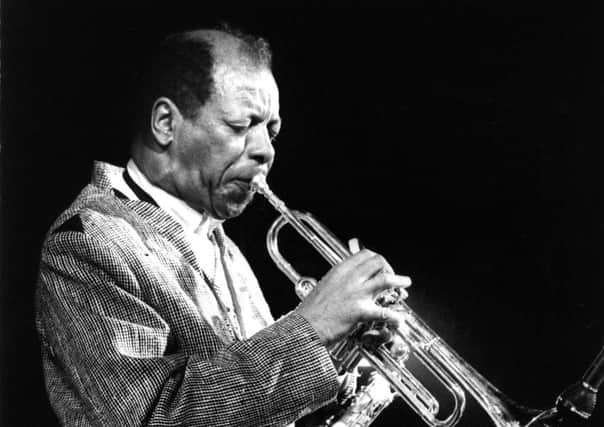All that jazz: Kenny Mathieson says goodbye


The phone rang for a suspiciously long time. Eventually, a sleepy, somewhat irritated voice answered. It belonged to Jimmy Smith, credited with inventing the popular soul-jazz organ trio genre, and one of the major figures in postwar jazz. What followed was my most uncomfortable ten minutes in almost 40 years of writing about jazz as an increasingly irascible Smith made it clear that talking to a journalist in Scotland was low on his list of priorities.
I ended the call with relief, and managed to extract enough to rescue a piece for The Scotsman. Happily, it was a rare event – in four decades of writing about jazz, I found musicians generally happy to talk about their lives and work, often at length if the circumstances allowed. Mind you, I never did attempt to interview Ginger Baker.
Advertisement
Hide AdAlthough I wrote regularly about a range of music, from rock to folk and classical, jazz held a particular fascination for me, and became my writing specialisation, albeit partly by accident and opportunity rather than planning. Eventually I inherited the role of jazz critic at The Scotsman from Tony Troon in 1992, and have held it ever since, in tandem with widespread freelance work for a range of publications.
It was not where I started with The Scotsman, though. A Glaswegian by birth and upbringing, I moved to Edinburgh in the mid-1980s from university in Norwich with a PhD that I would never make formal use of, and was looking around to add to my still modest freelance activities. I made my debut on the arts pages of The Scotsman in 1986, when my badgering of the late Allen Wright resulted in his asking me to cover a writing conference in Edinburgh. Allen was a significant mentor in that period, and I continued to write about a range of topics for him, as well as reviewing books for the literary editor at the time, Ian Bell.
Things could have been rather different. I was one of two people interviewed for the post of Classical Music critic that had been vacated by Conrad Wilson. Mary Miller got the job, and Tony Troon retired more or less simultaneously, resulting in my shuffling over from covering jazz for Scotland On Sunday, which I had done from the launch of the paper in 1988, to take on the same role at The Scotsman. I can’t say I envisaged that association lasting for over two decades, although we jazz critics do seem to dig in for the long haul.
Tracing the changes in jazz in Scotland in that time has been fascinating. Back in 1985, the Edinburgh Jazz Festival was strictly a traditional and mainstream event, mainly based in pubs; the Glasgow Jazz Festival still lay two years in the future; and a certain Tommy Smith was in the throes of a two-year stint at Berklee College in Boston, aided by a remarkable fundraising effort in Wester Hailes to send their prodigious young talent to that internationally famous jazz school.
The emergence of Smith and his contemporaries – Brian Kellock, the Bancroft twins, Kevin MacKenzie, John Rae and others – had a major revitalising effect on the indigenous jazz scene, and that process has continued unabated, increasingly channeled through the educational efforts of musicians like Smith at the Royal Conservatoire of Scotland, Richard Michael in Fife, and jazz courses at Napier and Strathclyde, among others.
The most prestigious development of all has to be the launch and remarkable evolution of the Scottish National Jazz Orchestra, which, in the last 20 years, has grown into a world-class big band with a hugely imaginative repertoire under the direction of its founder, that man Smith again.
Advertisement
Hide AdThere have been losses as well as gains, of course. Concerts featuring international artists are now rare outside of the festivals; there is never enough funding, and smaller venues continue to come and go, although Bill Kyle has successfully established The Jazz Bar in Edinburgh as an all-week music venue, an aspiration that I recall discussing with him way back in the late 1980s, and one which he has achieved in the face of many setbacks.
And the most memorable moment? An impossible question, really, but as a critic, you learn to develop a certain objectivity. However, if we apply the “hair standing up on the back of my neck” test, then it has to be Ornette Coleman’s Prime Time at the Queen’s Hall back in 1992.
Advertisement
Hide AdMy decision to stand down this summer, and thereby complete my retirement as a freelance writer, has been the outcome of a gradual process. I have no idea how many concerts and recordings I have reviewed over the years, but however many it is, it has come to seem enough. Time to step aside and give someone else a turn. I hope they enjoy it as much as I did.
Jim Gilchrist will now take over as The Scotsman’s jazz critic. To read his preview of the jazz and folk highlights of this year’s Edinburgh Fringe, see p.33. For album reviews, see p.34. For reviews from this year’s Edinburgh International Jazz Festival, see main paper.